The Brooklyn based social entrepreneur couple of Scot and Jacq Tatelman wanted to do something that created true impact. Not just donate product or a percentage of sales, but truly be in the community they serve.
In 2009 they were inspired. They founded Country Roads Foundation – a nonprofit organization that has served thousands of New York City kids.
After watching countless kids carrying their possessions in ripped trash bags, Scot and Jacq formed STATE Bags , a company that not only delivers much needed supplies, but also provides youth with the tools to reach their fullest potential and better their communities.
The first of many social impact avenues they took were Bag Drops. STATE Bags hosts frequent bag drops to underfunded schools and cities to provide backpacks and school supplies to children in need.
These bag drops are hosted with STATE Bags and other community members who speak to kids about their goals and the future, passing on valuable lessons and motivation through stories and personal experiences.
With thousands of backpacks donated through partnerships with Beyonce, the Dallas Cowboys, the White Sox, Nordstroms and inspirational discussion with kids, Scot and Jacq wanted to do more.
Scot and Jacq decided to start a multi-channel platform called What Do We Tell The Kids (#WHATDOWETELLTHEKIDS) to address key socio-economic problems facing the world, especially children who are effected.
Tackling large, mainstream issues like Black Lives Matter, mass incarceration, the Flint water crisis, LBGTQ issues and more, STATE Bags is creating a place for people to face these issues and ask the imperative question, what do we tell the kids?
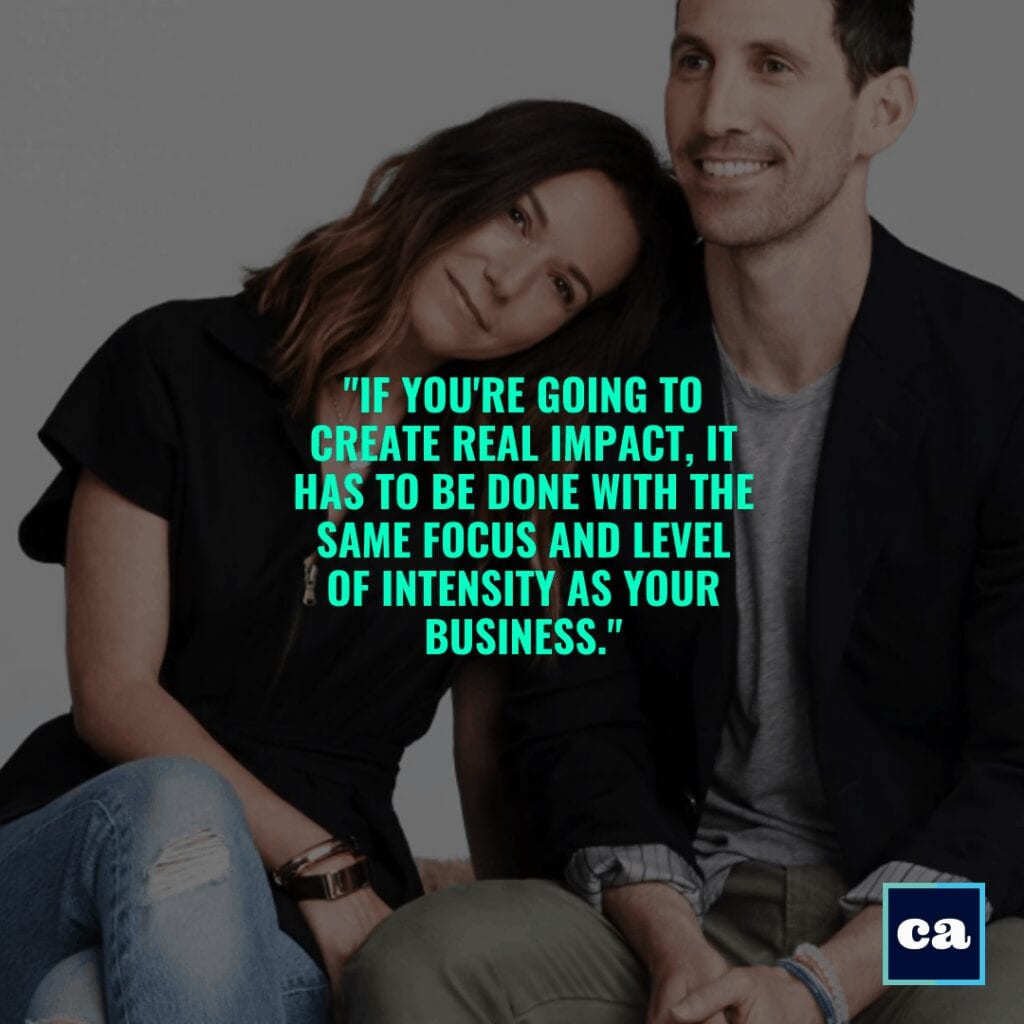
I had the great opportunity to interview with Scot Tatelman, co-founder of STATE Bags. We discussed why a backpack company decided to speak about social issues and the risk for a business to do so.
We discussed his interactions with coaches, students, police officers, and members of the community.
In speaking with Scot, I could tell in his voice this journey had truly changed him. His company received many angry emails from now former customers and some friends who vented their frustration.
“The one thing I learned about running a business is that you can’t please everyone, but if you want to make real impact you have to take real risks. We knew there would be negative blowback around some our initiatives and special projects, but if you have a platform, I believe it’s a responsibility to use it for good… in whatever way most speaks to you and your business.” – Scot Tatelman
Below is a powerful Q&A with Scot.
Q: Many brands shy away from social issues, but STATE Bags is diving in on spotlighting these issues. How did the idea of creating a platform around social issues come to be?
Since launching STATE Bags, we’ve been fairly obsessed with being more than just another one for one company.
My wife and I started a nonprofit summer camp for kids growing up in NYC’s most underfunded neighborhoods, so we knew that material donations are nice, but those alone wouldn’t carry the long-term impact we aimed to make on the kids STATE Bags would support.
In addition to donated backpacks, we’d come with role-model figures inspiring kids that they truly can beat the odds often stacked against them.
We’d put on incredibly unique experiences in our bag drop rallies and more recently, commit to using our platform to shed light on some of the most challenging social issues of our time through our #WhatDoWeTellTheKids projects.
The platform was created after overhearing kids at Camp Power talking to their counselors about the Black Lives Matter movement. Child development specialists, teachers and highly trained social workers struggled through conversations where kids were asking, “why don’t I matter?” or
“My teachers told me to act a certain way when approached by police, but the person killed last week did exactly that… what do I do?”
The question, “what do we tell the kids?” was so telling on so many levels, and we decided to use our growing platform to share these stories and raise awareness around a variety of issues.
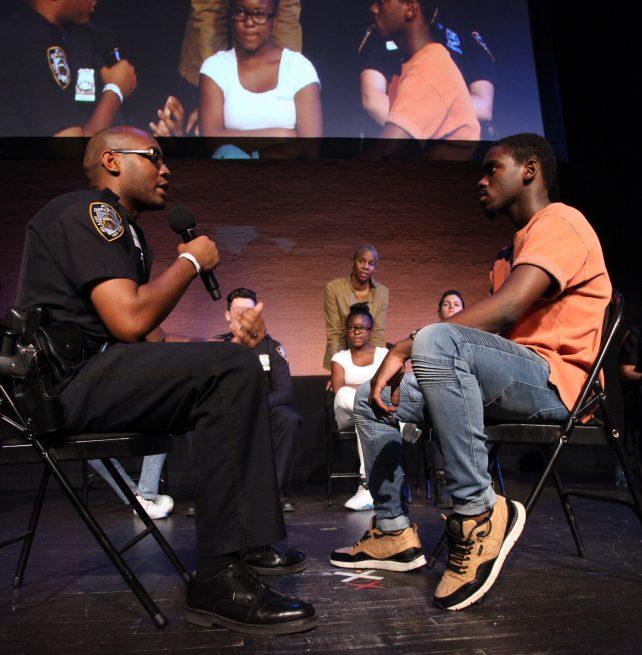
As a young brand that’s looking to gain followers and not lose them, it was a risky move, but one that we haven’t looked back from since launching it over 2 years ago.
Our company mission statement reads: “To make beautiful, well-made, inclusively-cool product while using the power of business to give back and shift narratives around social injustices.” Simply put, we want to be on the right side of history…
Q: What are some of the most impactful stories and topics you are proud of and people should read first?
I’m really proud of every #WhatDoWeTellTheKids initiative we’ve taken on – not only because they each accomplish the goal of shifting harmful social narratives in authentic, creative ways, but because they all hit home for me in different ways.
Our Black Lives Matter project was our first and incredibly emotional to carry out, hearing such committed people in my life share their struggles in talking to kids about this movement… and the fears shared by black parents that their children might not come home every night. I cried in every single interview.
Our LGBTQ initiative was created both in honor of my uncle who passed away of AIDS as well as the mounting fear the community was feeling in 2016. Some very impressive people from all walks of life really opened up, and it put the platform on the map.
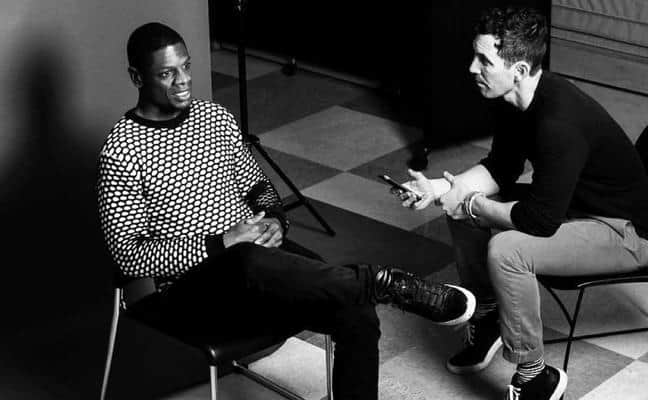
Our Erase The R Word video has been used as a teaching tool across the globe, and carries such a simple message – just stop saying the word!
Our Chicago short film is one of the bigger accomplishments of my life. Not only did it directly combat the incredibly negative, off-base narrative around the youth of Chicago’s inner cities, but it was the official beginning of us welcoming in kids from outside of NYC to Camp Power.
The three kids featured in the film came to camp that summer, and seeing them get off the bus was a moment I will never forget.
Our Mass Incarceration initiative was easily the most enlightening to me as the education I got from working with the crew from Echoes of Incarceration was better than anything I could have gotten in four years of college.
We told their stories and the crippling effects of mass incarceration on families and communities in a beautiful, impactful way.
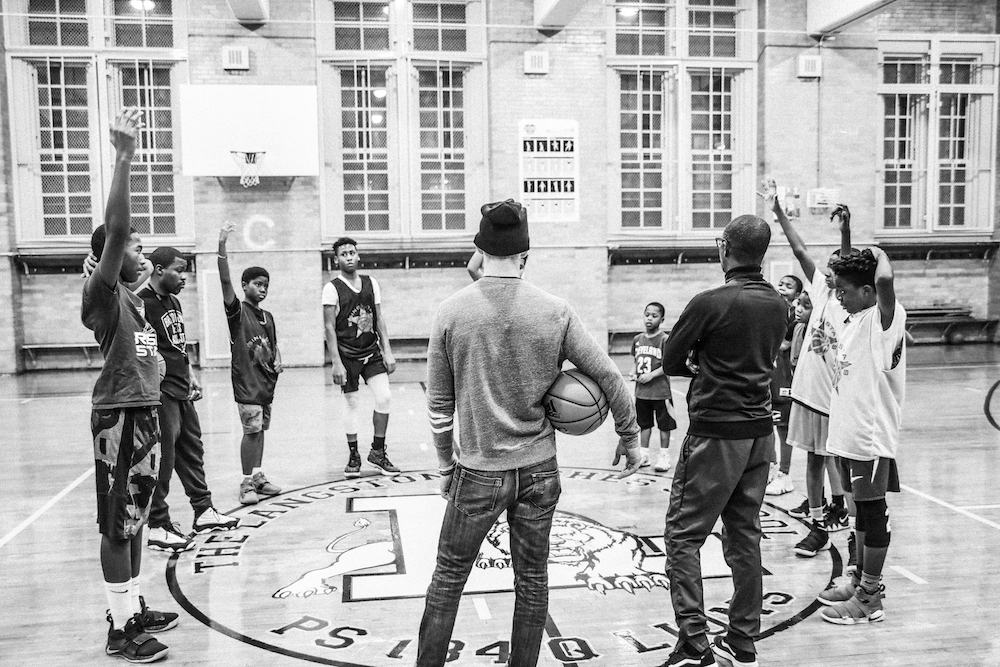
The Flint Initiative was more built out than anything we had ever done. The Fantastic Five we were able to bring together, the phenomenal illustrations by Butcher Billy, the bag drop rally, donating tens of thousands of bags during back to school season.
It was the largest initiative we’d ever done, and helped to shed light on the ongoing issues the proud city of Flint was still battling.
Why We Kneel may have been our riskiest project considering the polarizing feel of the topic we tackled. Every interview and featured coach is worth the read, and officially kicked off our new mission by making a financial contribution to Operation Conversation: Cops & Kids.
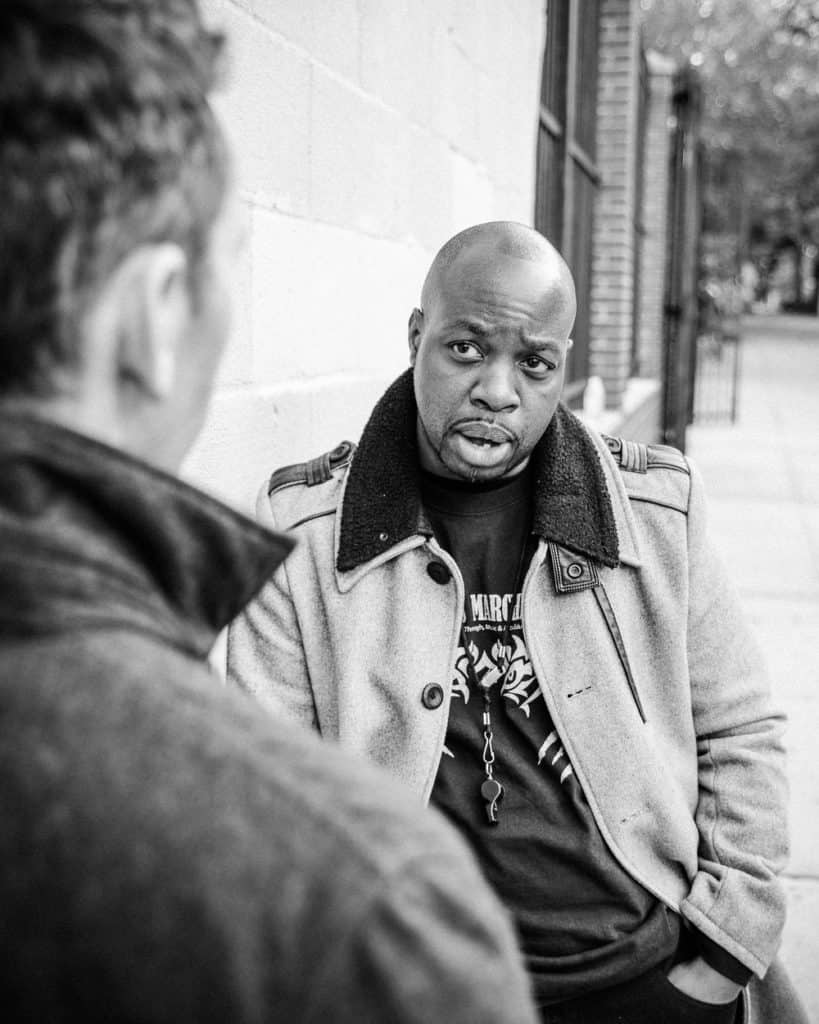
Excerpt from a discussion with a parent about Anthem Kneeling:
ST: What are you telling your kids about the anthem protests and the stance that Kaepernick has taken?
KH: I tell them that they have to know why they’re kneeling. If one of my kids wanted to kneel for the anthem, I’d tell them that you’d have to know why you’re taking that knee. Do your homework before taking that stance.
OS: The way I approach the students about it is I ask them why they stand or don’t stand… and based on their response, it determines how far into the conversation we get.
If you’re making a choice or decision and don’t do your own research or have a purpose, that means you’re doing it not because you want to do it. It has to be a clear understanding from them based on their own opinion that’s based on their own facts or beliefs. Read full discussion here.
Q: The Flint Water Crisis, Mass Incarceration, LBGTQ, Anthem Kneeling, and so on.
Are you disappointed in our large media outlets for not talking about this more?
Do you feel as a brand you should have the responsibility of shedding light on these issues?
It really bums me out that there isn’t more attention being brought to these issues impacting so many, but I’m also aware of the fatigue from the flood of huge challenges we’re up against right now… it feels endless, and gives this collective feeling of “where do we begin?”
My personal feeling is that if you have any form of platform that people trust and listen to, it’s 100% a responsibility to use it as a microphone to make the world a better, more empathetic place… in whatever way makes most sense for you.
How we use our platform isn’t necessarily right or the only way – it’s just true to who we are as human beings and a company.
Q: What have been some of the most inspiring lessons learned throughout the creation of these stories and platform?
Last summer when I was building out the Flint Initiative, I was talking to an educator there about my vision of supporting the community during back to school, and she took a long breath and said, “Thousands of donated backpacks would be really nice… but what we really need is for people to know that our water is still poisoned.”
That statement was not only the catalyst for us building out such a layered, calculated approach to The Flint Initiative, but also the moment we referenced when retiring our STATE Bags one for one model and supporting American children and families in need… but in the ways they need it most.
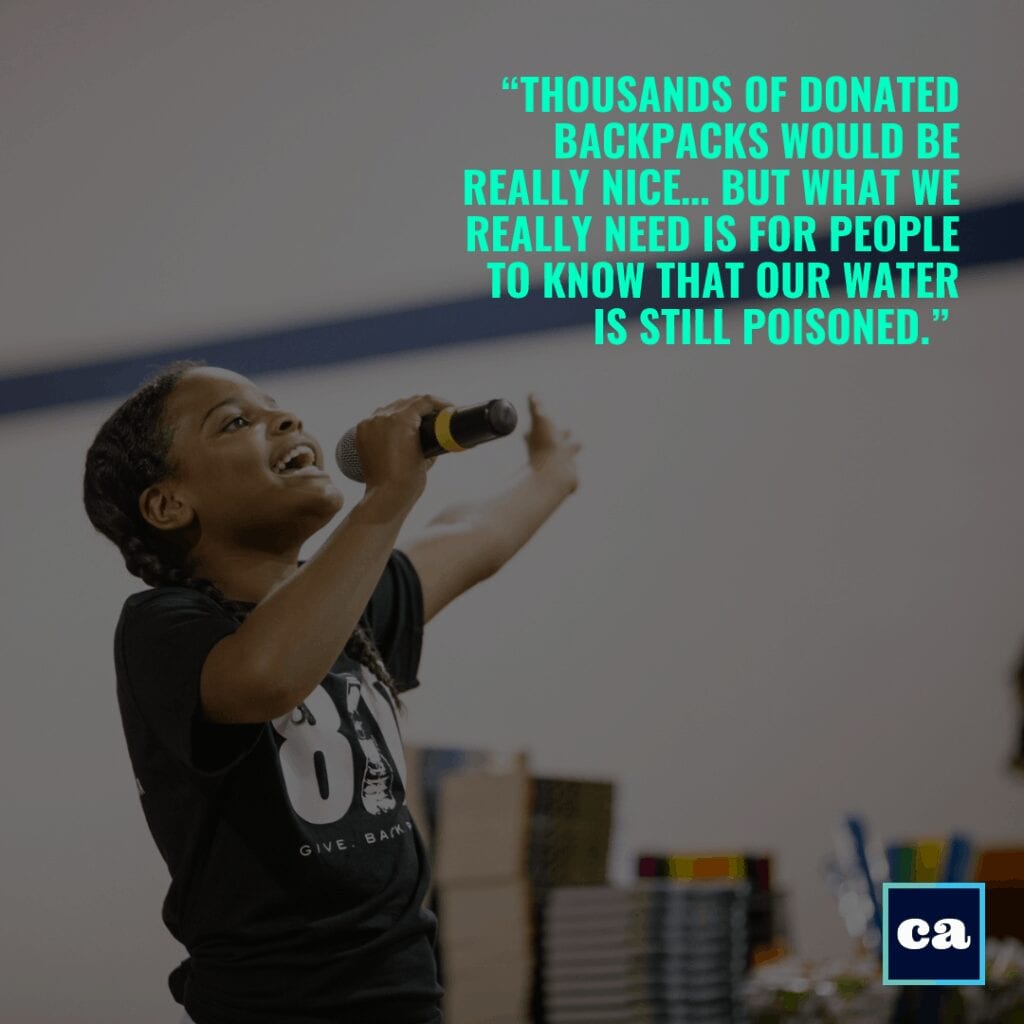
Q: Since STATE Bags has been in and around schools for the past few years doing its bag drops, what are some of the tough issues facing our public school system?
I asked one of the coaches featured in our “Why We Kneel” project how and if he was talking to his players about the stance Colin Kaepernick has taken.
He told me about a conversation he had with a 10 year old black child who had been convinced by a friend that white people are scientifically proven to be smarter than blacks.
He went on to say, “The Kaepernick thing just doesn’t get talked about as much because I have to deal with a child that is feeling and convinced that he is less than – the coaches at this level are more focused around character building. Kids asking, “who am I, and what value does the world think I bring?”
At the lower level, they don’t know who they are and the day to day character issues that we have to deal with in just functioning in our community is challenging enough. That kids are feeling less than…”
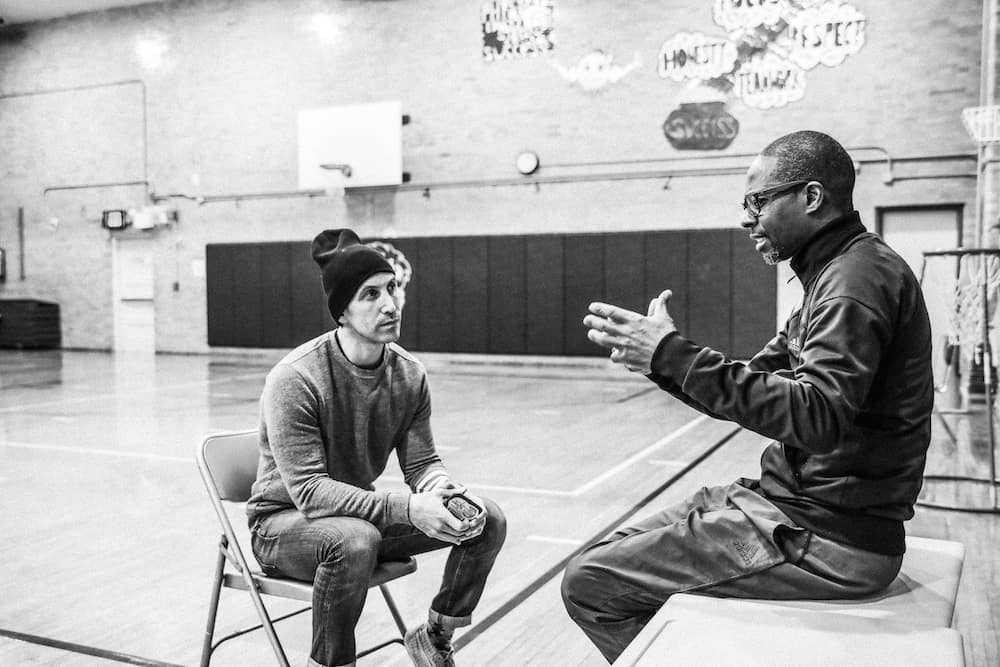
Q: How can a backpack company be a force on social issues, what is the overall goal and mission of this campaign?
Whether you’re selling backpacks, batteries or bras, if you have an audience, you can be a force. I’m a big believer though that to properly take on social issues as a brand, you need to do so with the same focus and tenacity as you would in creating a financial or marketing plan.
If it’s done half-ass or with the goal of just being part of the conversation or in the fold of the socially conscious space, it’s going to come across disingenuous and with customers feeling like there’s a hidden agenda tied to it.
People are savvy now – they know what’s real and what isn’t… and for the world and brands that are doing it with the mission of making a genuine impact, that’s a very good thing!
Listen to Causeartist podcasts here.
Latest Stories
- What are Plant Based Fibers
- 7 Sustainable and Eco Friendly Floss Options
- Anshul Magotra: How Social Innovation Circle Supports Impact Entrepreneurs
- Causeartist Brief – U.S. Department of Energy x Google, Bezos Centers for Sustainable Protein, Oregon Biochar Solutions
- Evidencity: Pioneering the Fight Against Modern Slavery Through Tech







